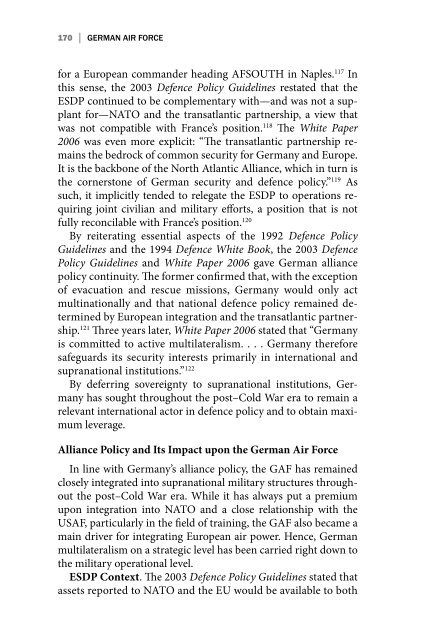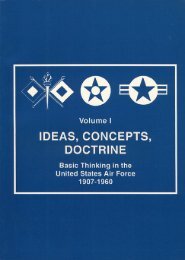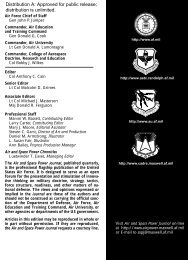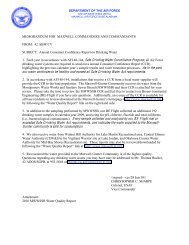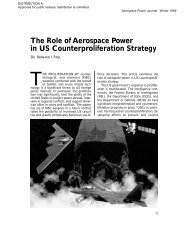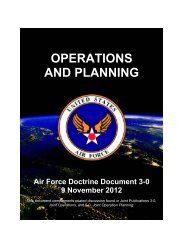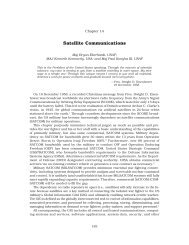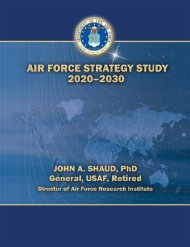- Page 3 and 4:
The Quest for Relevant Air Power
- Page 5 and 6:
The Quest for Relevant Air Power Co
- Page 7:
Dedicated to my parents, Olga and C
- Page 10 and 11:
CONTENTS Chapter Page How Have Fren
- Page 12 and 13:
CONTENTS Table Illustrations Page 1
- Page 14 and 15:
CONTENTS Photo Page Eurofighter Typ
- Page 17 and 18:
Foreword During the Cold War, the c
- Page 19:
About the Author Christian F. Anrig
- Page 22 and 23:
ACKNOWLEDGMENTS opment in France; C
- Page 24 and 25:
ACKNOWLEDGMENTS retired, who helped
- Page 26 and 27:
2 │ INTRODUCTION Courtesy Gripen
- Page 28 and 29:
4 │ INTRODUCTION ing an air bridg
- Page 30 and 31:
6 │ INTRODUCTION Cooperative vent
- Page 32 and 33:
8 │ INTRODUCTION Continental Euro
- Page 34 and 35:
10 │ INTRODUCTION more expedition
- Page 37 and 38:
Chapter 2 Post-Cold War Challenges
- Page 39 and 40:
POST-COLD WAR CHALLENGES │ 15 str
- Page 41 and 42:
POST-COLD WAR CHALLENGES │ 17 sig
- Page 43 and 44:
POST-COLD WAR CHALLENGES │ 19 str
- Page 45 and 46:
POST-COLD WAR CHALLENGES │ 21 Est
- Page 47 and 48:
POST-COLD WAR CHALLENGES │ 23 bor
- Page 49 and 50:
POST-COLD WAR CHALLENGES │ 25 of
- Page 51 and 52:
POST-COLD WAR CHALLENGES │ 27 Emp
- Page 53 and 54:
POST-COLD WAR CHALLENGES │ 29 Kuw
- Page 55 and 56:
POST-COLD WAR CHALLENGES │ 31 man
- Page 57 and 58:
POST-COLD WAR CHALLENGES │ 33 All
- Page 59 and 60:
POST-COLD WAR CHALLENGES │ 35 mul
- Page 61 and 62:
POST-COLD WAR CHALLENGES │ 37 Por
- Page 63 and 64:
POST-COLD WAR CHALLENGES │ 39 be
- Page 65 and 66:
POST-COLD WAR CHALLENGES │ 41 war
- Page 67 and 68:
POST-COLD WAR CHALLENGES │ 43 The
- Page 69 and 70:
POST-COLD WAR CHALLENGES │ 45 pat
- Page 71 and 72:
POST-COLD WAR CHALLENGES │ 47 com
- Page 73 and 74:
POST-COLD WAR CHALLENGES │ 49 pow
- Page 75 and 76:
POST-COLD WAR CHALLENGES │ 51 and
- Page 77 and 78:
POST-COLD WAR CHALLENGES │ 53 Cou
- Page 79 and 80:
POST-COLD WAR CHALLENGES │ 55 Cou
- Page 81 and 82:
POST-COLD WAR CHALLENGES │ 57 of
- Page 83 and 84:
POST-COLD WAR CHALLENGES │ 59 tic
- Page 85 and 86:
POST-COLD WAR CHALLENGES │ 61 Int
- Page 87 and 88:
POST-COLD WAR CHALLENGES │ 63 USA
- Page 89 and 90:
POST-COLD WAR CHALLENGES │ 65 ed.
- Page 91 and 92:
POST-COLD WAR CHALLENGES │ 67 (92
- Page 93 and 94:
POST-COLD WAR CHALLENGES │ 69 89.
- Page 95 and 96:
POST-COLD WAR CHALLENGES │ 71 Mul
- Page 97 and 98:
POST-COLD WAR CHALLENGES │ 73 175
- Page 99 and 100:
POST-COLD WAR CHALLENGES │ 75 231
- Page 101 and 102:
POST-COLD WAR CHALLENGES │ 77 fen
- Page 103:
POST-COLD WAR CHALLENGES │ 79 314
- Page 106 and 107:
82 │ French Air Force Courtesy FA
- Page 108 and 109:
84 │ French Air Force the previou
- Page 110 and 111:
86 │ French Air Force crisis mana
- Page 112 and 113:
88 │ French Air Force FAF’s con
- Page 114 and 115:
90 │ French Air Force attaining t
- Page 116 and 117:
92 │ French Air Force latter was
- Page 118 and 119:
94 │ French Air Force Franco-NATO
- Page 120 and 121:
96 │ French Air Force Alliance Po
- Page 122 and 123:
98 │ French Air Force they provid
- Page 124 and 125:
100 │ French Air Force FAF to tes
- Page 126 and 127:
102 │ French Air Force French Con
- Page 128 and 129:
104 │ French Air Force Courtesy F
- Page 130 and 131:
106 │ French Air Force sance miss
- Page 132 and 133:
108 │ French Air Force Both in th
- Page 134 and 135:
110 │ French Air Force Courtesy F
- Page 136 and 137:
112 │ French Air Force How Has th
- Page 138 and 139:
114 │ French Air Force Penser les
- Page 140 and 141:
116 │ French Air Force Teaching o
- Page 142 and 143:
118 │ French Air Force Whereas th
- Page 144 and 145: 120 │ French Air Force Warden’s
- Page 146 and 147: 122 │ French Air Force term barga
- Page 148 and 149: 124 │ French Air Force they could
- Page 150 and 151: 126 │ French Air Force 1990s, the
- Page 152 and 153: 128 │ French Air Force 1960s, whe
- Page 154 and 155: 130 │ French Air Force Interopera
- Page 156 and 157: 132 │ French Air Force In the dom
- Page 158 and 159: 134 │ French Air Force Before 200
- Page 160 and 161: 136 │ French Air Force Notes 1. J
- Page 162 and 163: 138 │ French Air Force 54. MOD, F
- Page 164 and 165: 140 │ French Air Force 111. Jér
- Page 166 and 167: 142 │ French Air Force 154. Utley
- Page 168 and 169: 144 │ French Air Force 197. Col J
- Page 170 and 171: 146 │ French Air Force 231. Col R
- Page 172 and 173: 148 │ French Air Force _defense/l
- Page 175 and 176: Chapter 4 German Air Force (Luftwaf
- Page 177 and 178: GERMAN Air Force │ 153 and actual
- Page 179 and 180: GERMAN Air Force │ 155 • contri
- Page 181 and 182: GERMAN Air Force │ 157 forces to
- Page 183 and 184: GERMAN Air Force │ 159 minister,
- Page 185 and 186: GERMAN Air Force │ 161 Moreover,
- Page 187 and 188: GERMAN Air Force │ 163 Centre (Na
- Page 189 and 190: GERMAN Air Force │ 165 airspace s
- Page 191 and 192: GERMAN Air Force │ 167 for full e
- Page 193: GERMAN Air Force │ 169 new era co
- Page 197 and 198: GERMAN Air Force │ 173 assets suc
- Page 199 and 200: GERMAN Air Force │ 175 eration wa
- Page 201 and 202: GERMAN Air Force │ 177 Germany’
- Page 203 and 204: GERMAN Air Force │ 179 craft. 174
- Page 205 and 206: GERMAN Air Force │ 181 Germany’
- Page 207 and 208: GERMAN Air Force │ 183 German con
- Page 209 and 210: GERMAN Air Force │ 185 airliners
- Page 211 and 212: GERMAN Air Force │ 187 publish a
- Page 213 and 214: GERMAN Air Force │ 189 is in gene
- Page 215 and 216: GERMAN Air Force │ 191 Germany’
- Page 217 and 218: GERMAN Air Force │ 193 Sicherheit
- Page 219 and 220: GERMAN Air Force │ 195 With the u
- Page 221 and 222: GERMAN Air Force │ 197 In the fie
- Page 223 and 224: GERMAN Air Force │ 199 GAF Transa
- Page 225 and 226: GERMAN Air Force │ 201 reform in
- Page 227 and 228: GERMAN Air Force │ 203 GAF Patrio
- Page 229 and 230: GERMAN Air Force │ 205 means to a
- Page 231 and 232: GERMAN Air Force │ 207 4. Hans-We
- Page 233 and 234: GERMAN Air Force │ 209 56. Intern
- Page 235 and 236: GERMAN Air Force │ 211 104. Inter
- Page 237 and 238: GERMAN Air Force │ 213 169. Grund
- Page 239 and 240: GERMAN Air Force │ 215 230. Vogt
- Page 241 and 242: GERMAN Air Force │ 217 rung des P
- Page 243 and 244: GERMAN Air Force │ 219 302. Newdi
- Page 245 and 246:
Chapter 5 Royal Netherlands Air For
- Page 247 and 248:
ROYAL NETHERLANDS Air Force │ 223
- Page 249 and 250:
ROYAL NETHERLANDS Air Force │ 225
- Page 251 and 252:
ROYAL NETHERLANDS Air Force │ 227
- Page 253 and 254:
ROYAL NETHERLANDS Air Force │ 229
- Page 255 and 256:
ROYAL NETHERLANDS Air Force │ 231
- Page 257 and 258:
ROYAL NETHERLANDS Air Force │ 233
- Page 259 and 260:
ROYAL NETHERLANDS Air Force │ 235
- Page 261 and 262:
ROYAL NETHERLANDS Air Force │ 237
- Page 263 and 264:
ROYAL NETHERLANDS Air Force │ 239
- Page 265 and 266:
ROYAL NETHERLANDS Air Force │ 241
- Page 267 and 268:
ROYAL NETHERLANDS Air Force │ 243
- Page 269 and 270:
ROYAL NETHERLANDS Air Force │ 245
- Page 271 and 272:
ROYAL NETHERLANDS Air Force │ 247
- Page 273 and 274:
ROYAL NETHERLANDS Air Force │ 249
- Page 275 and 276:
ROYAL NETHERLANDS Air Force │ 251
- Page 277 and 278:
ROYAL NETHERLANDS Air Force │ 253
- Page 279 and 280:
ROYAL NETHERLANDS Air Force │ 255
- Page 281 and 282:
ROYAL NETHERLANDS Air Force │ 257
- Page 283 and 284:
ROYAL NETHERLANDS Air Force │ 259
- Page 285 and 286:
ROYAL NETHERLANDS Air Force │ 261
- Page 287 and 288:
ROYAL NETHERLANDS Air Force │ 263
- Page 289 and 290:
ROYAL NETHERLANDS Air Force │ 265
- Page 291 and 292:
ROYAL NETHERLANDS Air Force │ 267
- Page 293 and 294:
ROYAL NETHERLANDS Air Force │ 269
- Page 295 and 296:
ROYAL NETHERLANDS Air Force │ 271
- Page 297 and 298:
ROYAL NETHERLANDS Air Force │ 273
- Page 299 and 300:
ROYAL NETHERLANDS Air Force │ 275
- Page 301:
ROYAL NETHERLANDS Air Force │ 277
- Page 304 and 305:
280 │ Swedish Air Force Cold War,
- Page 306 and 307:
282 │ Swedish Air Force Threat an
- Page 308 and 309:
284 │ Swedish Air Force the risk
- Page 310 and 311:
286 │ Swedish Air Force took plac
- Page 312 and 313:
288 │ Swedish Air Force maritime
- Page 314 and 315:
290 │ Swedish Air Force streamlin
- Page 316 and 317:
292 │ Swedish Air Force of a full
- Page 318 and 319:
294 │ Swedish Air Force liaison,
- Page 320 and 321:
296 │ Swedish Air Force This deve
- Page 322 and 323:
298 │ Swedish Air Force ticipatio
- Page 324 and 325:
300 │ Swedish Air Force malised p
- Page 326 and 327:
302 │ Swedish Air Force Annah Lin
- Page 328 and 329:
304 │ Swedish Air Force around th
- Page 330 and 331:
306 │ Swedish Air Force Démocrat
- Page 332 and 333:
308 │ Swedish Air Force air power
- Page 334 and 335:
310 │ Swedish Air Force defence r
- Page 336 and 337:
312 │ Swedish Air Force staff col
- Page 338 and 339:
314 │ Swedish Air Force continuou
- Page 340 and 341:
316 │ Swedish Air Force Courtesy
- Page 342 and 343:
318 │ Swedish Air Force Paveway I
- Page 344 and 345:
320 │ Swedish Air Force C4ISTAR D
- Page 346 and 347:
322 │ Swedish Air Force Courtesy
- Page 348 and 349:
324 │ Swedish Air Force critical
- Page 350 and 351:
326 │ Swedish Air Force risk perc
- Page 352 and 353:
328 │ Swedish Air Force 21. MOD,
- Page 354 and 355:
330 │ Swedish Air Force 64. Organ
- Page 356 and 357:
332 │ Swedish Air Force 113. Jorg
- Page 358 and 359:
334 │ Swedish Air Force 169. Ibid
- Page 360 and 361:
336 │ Swedish Air Force 226. Pers
- Page 362 and 363:
338 │ CONCLUSION ern concepts—i
- Page 364 and 365:
340 │ CONCLUSION Table 7. Force r
- Page 366 and 367:
342 │ CONCLUSION While including
- Page 368 and 369:
344 │ CONCLUSION Unlike France, G
- Page 370 and 371:
346 │ CONCLUSION such as airborne
- Page 372 and 373:
348 │ CONCLUSION NBG Gripen detac
- Page 374 and 375:
350 │ CONCLUSION armament, and C4
- Page 376 and 377:
352 │ CONCLUSION RNLAF leadership
- Page 378 and 379:
354 │ CONCLUSION study course com
- Page 380 and 381:
356 │ CONCLUSION strengthen the i
- Page 382 and 383:
358 │ CONCLUSION craft such as th
- Page 384 and 385:
360 │ CONCLUSION Courtesy Gripen
- Page 386 and 387:
362 │ CONCLUSION 1,000 aircraft i
- Page 388 and 389:
364 │ ABBREVIATIONS CESAM CFSP CI
- Page 390 and 391:
366 │ ABBREVIATIONS LPM MALE MANP
- Page 393 and 394:
Selected Bibliography This selected
- Page 395 and 396:
BIBLIOGRAPHY │ 371 Schmidt, Col (
- Page 397 and 398:
BIBLIOGRAPHY │ 373 ———. Wei
- Page 399 and 400:
BIBLIOGRAPHY │ 375 ———. Les
- Page 401 and 402:
BIBLIOGRAPHY │ 377 Books and Arti
- Page 403 and 404:
BIBLIOGRAPHY │ 379 Defense Indust
- Page 405 and 406:
BIBLIOGRAPHY │ 381 for a White Pa
- Page 407 and 408:
BIBLIOGRAPHY │ 383 Keaney, Thomas
- Page 409 and 410:
BIBLIOGRAPHY │ 385 ———. “
- Page 411 and 412:
BIBLIOGRAPHY │ 387 ———. “
- Page 413 and 414:
Index A400M, 26, 52-53, 55, 60, 90,
- Page 415 and 416:
INDEX │ 391 air-to-ground surveil
- Page 417 and 418:
INDEX │ 393 171, 184, 187, 201-2,
- Page 419 and 420:
INDEX │ 395 Franco-Belgian Advanc
- Page 421 and 422:
INDEX │ 397 man-portable air defe
- Page 423 and 424:
INDEX │ 399 SAMP-T. See sol-air m
- Page 425:
The Quest for Relevant Air Power Co


